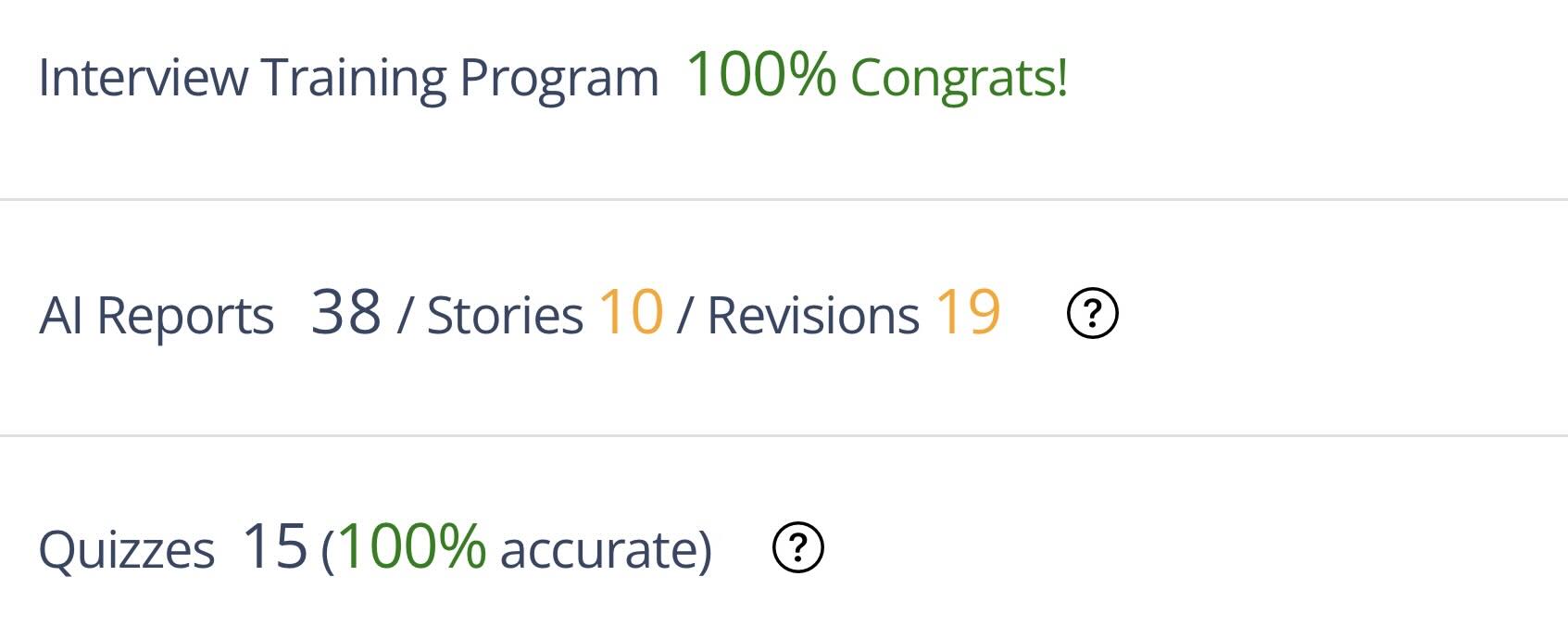TikTok Interview Training Program

Videos
Easy to follow advice on how to best answer any non-technical interview question.
Assessments
Each module includes short knowledge-check assessments plus longer, skill-building evaluations.
- Practice identifying core behaviors in unfamiliar contexts
- Interviewing secrets
- Mistakes to avoid
Extras
Various experiments.
- Stories Dashboard: Add, revise, rank & label your stories - using both quantitative & qualitative indicators (e.g. revisions to stories ratio)
- 17 types of feedback reports on your answers from 3 AI engines
- Predict questions for your upcoming interview based on your specific scenario, using AI
- Demo story bank - how could your story bank look like? Using AI
- 229 YouTube videos summarized
- List with over 1k behavioral interview questions
TikTok’s Leadership Principles mapped to key sections in the training program
Note: the second half of this list is for Manager level roles, while the first part perfectly applies for Individual Contributor roles. (similar Leadership Principles apply to many other high performing companies)
- Be mission and vision driven
- Think big, bold and ambitiously to inspire others in pursuit of our mission.
- Always keep our overall vision and the long-term outcomes in mind when developing strategies. Prioritize innovative and meaningful breakthroughs.
- Understand the fundamentals to develop sound judgement
- Get to the root of problems and seek critical improvement.
- Be clear and firm when developing conclusions. Steer away from ambiguity. Carefully and thoughtfully consider feedback and different viewpoints, but do not reflexively change your judgment without a solid case.
- Focus on actual impact
- Put users first and prioritize user feedback. Focus on real impact.
- Be practical and communicate in plain language. Avoid embellishing achievements, using abstract expressions or jargon, or letting style substitute for substance.
- Small ego, big picture
- Avoid titles or honorifics, and don't focus on hierarchy. Prioritize business needs and show flexibility in reporting lines.
- Think beyond your role. Take ownership in your scope of work while keeping the bigger picture in mind.
- Leadership is a responsibility, not a privilege. Focus on impact, and continue to demand more of yourself as you take on more senior roles.
- Leverage collective wisdom
- Provide sufficient context to partners and team members, and ensure efficient information sharing.
- Encourage participation from everyone to develop better ideas.
- Lead by example
- Be a role model of ByteStyle and be responsible for building team culture.
- Be fair and trustworthy. Uphold high ethical standards. Create a work environment that promotes integrity.
- Lead people based on their qualities
- Foster the growth of team members
- Manage with firm principles
- Set ambitious and clear goals
- Be resilient and achieve results
Sections in the training program: Vision & Strategic Thinking, Prioritization & Speed
Sections in the training program: Dealing with ambiguity (through Deep Dives) - Section 1, Section 2
Section in the training program: Deliver Results
Sections in the training program: Vision & Strategic Thinking, Learning & Innovation
Sections in the training program: Influence & Conflict (section 1, section 2)
The training program encourages you to reason by analogy and sell the best version of yourself (including your strengths & weakness). Leadership is the backbone of this exercise.
Sections in the training program with references to Manager Level Roles: Conflict & Influence, Vision & Strategic Thinking, Deliver Results;
Manager Level Roles: a great variety of interview questions for manager level roles available throughout the training program.
Are TikTok’s interviews for technical roles also behavioral? Yes. Any high performing company uses behavioral interviews extensively. Furthermore, on their career page, the video tips for technical roles advise you to show your personality & “be yourself” (e.g. how do you handle conflict? tough feedback from your manager?). Clarity of thought is equally important during behavioral interviews, often showcased by using the STAR format.
Pricing
Access to training is included in the 3x, 5x coaching packages ($1050, $1750)